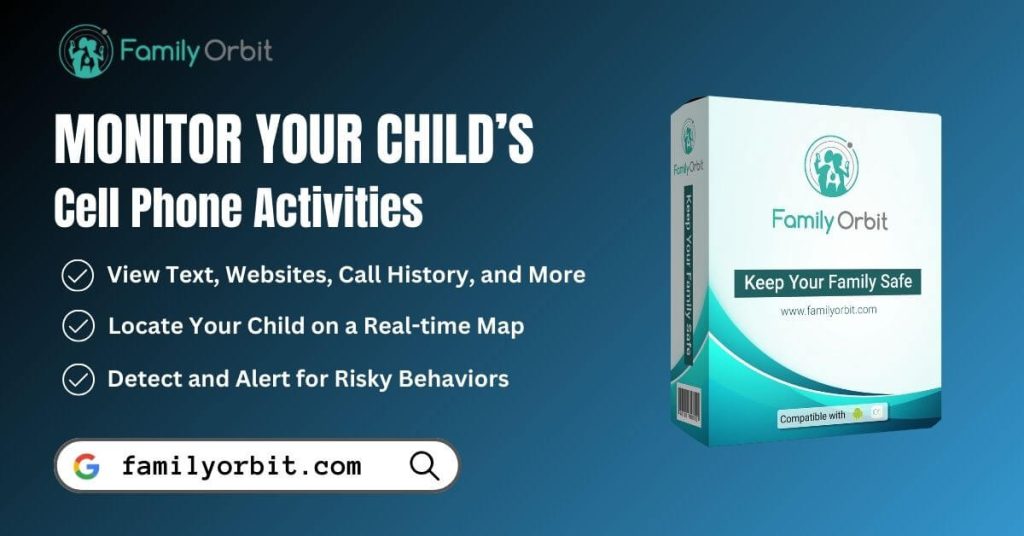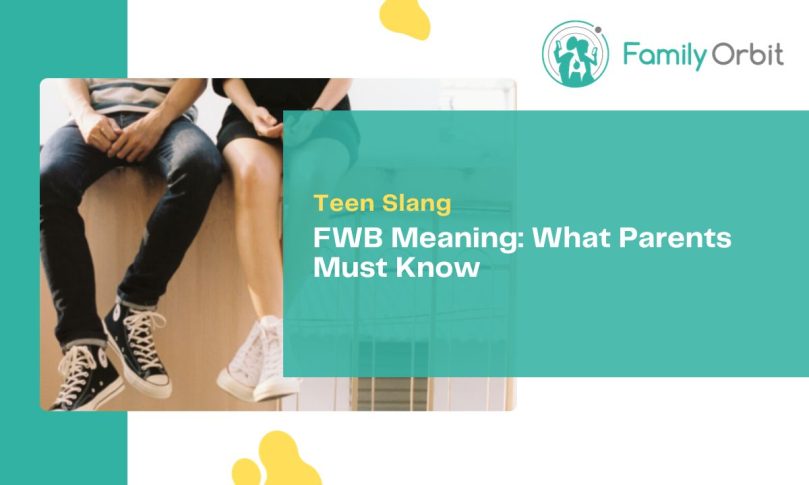As a parent, it’s important to stay informed and up to date on the language our kids use to better understand their online activities and interactions. Doing so will ensure their safety at all times, whether virtually or in the real world.
Here we’ll dig into the meaning of FWB and where teens often use the term. We will also discuss other important details related to the topic to help you navigate the online world with confidence. Let’s read on to find out more!
Cracking the Code: What Does FWB Mean?
FWB is a common online term that means “Friends with Benefits”. It describes a relationship between two people who get together to engage in non-committal and casual sexual activities while keeping a good friendship with each other.
Compared to classic romantic relationships, FWB relationships are usually linked to physical intimacy without any commitment or emotional connections associated with romantic couples. Anyone in this arrangement usually wants companionship/friendship and sexual satisfaction without romantic love, commitment, or exclusivity.
The Hidden World of FWB: Origins and Popularity
FWB surfaced from pop culture and has been used for a long time to describe casual sexual relationships without commitment. The term was prominent in the 1990s and early 2000s thanks to various music, TV shows, and movies that showed this type of relationship. With the rising popularity of social media platforms and online communication, the spread of this term grew further.
When it comes to the term’s popularity among teenagers, it can be attributed to their increased internet/online access. Teens usually adopt slang and terms from sources like music, movies, and social media. They’ve likely come across the term during online chats, random social media posts, and conversations with their peers.
Also, remember that teens are naturally curious about things, especially those linked to relationships and sex. As a result, terms like FWB will pique their interest and will definitely be included in their online lingo.
It’s important for you, as a parent or guardian, to know these terms and trends to be able to communicate with your teens. With this knowledge, you’ll be able to discuss responsible online behavior, consent, and relationships with your teens.
Examples Galore: How Teens Use FWB

Here we’ll share some examples of how teens use FWB during their online activities.
Texting or Messaging Others – In text conversations, your teen might say, “Cassie and I are FWB. We usually hang out and, well, have fun.”
Social Media Posts – Here, your teen may post a status update that looks like this: “Hi! Looking for a new FWB within the area. Send me a DM if interested.”
Online Dating Profiles – Your teens may secretly have an online dating profile. That means, there’s a possibility that their profile indicates they’re looking for an FWB rather than a serious relationship to clarify their intentions.
Memes – Memes are images, texts, or videos that are funny in nature and are spread rapidly online. Your teen could be sending/sharing these in group chats, and the theme of their meme could be related to FWB relationships.
Online Blogs and Forums – Teens usually visit these platforms for advice or to share stories about their FWB relationships/situations to gather insights from others with similar setups.
Context is Key: Understanding FWB in Conversations
Understanding FWB in conversations with your teens can be a huge challenge. However, as a parent or guardian, it’s important for you to stay updated and informed to engage in such openness and communication.
Here are the steps you can take to better understand the term:
- Research and stay informed.
- Ask your teens directly if you hear them use the term.
- When your teen explains FWB, listen actively and avoid interrupting them.
- Clarify and discuss with your teen after they provide their explanation.
- Use this opportunity to discuss boundaries and consent. Also, tell your teens how important these are in FWB setups or any type of relationship. Emphasize the need for open communication and most importantly, mutual respect.
- Continue to educate yourself on online lingo because these evolve rapidly. Doing so becomes an ongoing effort to keep you connected with your teen’s online activities.
FWB on Social Media: Where It’s Making Waves

FWB is often used on various social media platforms, online communities, and online dating apps where discussions about dating and relationships happen. Here are some of the usual instances where you might encounter FWB on social media:
Dating Apps – Individuals can include FWB on their profiles on dating apps like Bumble, Tinder, OkCupid, etc. Doing so indicates that they’re seeking a friends-with-benefits arrangement instead of the traditional romantic one.
Messaging Apps – Apps like WhatsApp, Facebook Messenger, and Twitter are more for private conversations and messaging. Teens who interact in private also use the term FWB when they talk about things related to it.
Social Media Posts – Sometimes teens on Facebook, Twitter, and even Instagram openly share or allude to situations related to FWB in their posts, comments, or status updates.
Online Forums and Communities – Teens usually join online communities and forums dedicated to dating, relationships, etc. In these spaces, they likely use FWB when discussing with others about such topics. A popular community is Omegle which is open to paedophiles and predators.
While FWB is used on social media, keep in mind that its implications and meaning can differ among people. For teens, the term could be used to describe levels of emotional and physical involvement. This is why understanding it in conversations is vital to interpret its meaning.
Behind Closed Doors: Why Teens Embrace FWB Slang
Interestingly, teens use the slang FWB because it gives them a concise way of describing non-committal, casual relationships. It helps them easily discuss physical and emotional connections with their peers.
Parental Alert: Your Teen and FWB Slang

With the rise of social media apps, teens get more exposed to slang and acronyms that aren’t readily understood by you, the parents. FWB is one of those terms that can leave you puzzled and wary, especially if it’s the first time you’ve come across it.
Since the term refers to a kind of casual relationship where people engage in physical intimacy without commitments, it’s best to be aware of the slang.
As a parent, knowing about it helps facilitate informed and open discussions with your teens about consent, relationships, boundaries, and their emotional well-being. Ultimately, it will also improve healthier communication and understanding between you, your teens, and the family.
Bridging the Gap: Communication with Family Orbit
It can feel like a never-ending challenge to keep your children safe online. One of the best ways to do it is with a monitoring tool, such as Family Orbit. This allows you to see what your teens are saying and you can raise concerns if you see any terms such as FWB.
Understanding these terms that teens encounter helps you engage in thoughtful, honest, and meaningful discussions with your teens. Communicating with them will help build a healthier and stronger family bond while promoting the emotional development of your teen.
- Monitor Calls & Text Messages
- View Photos and Videos
- Location Tracking & Geofence
- Monitor WhatsApp & Kik
- Detect & Alert for Inappropriate Activities
- Monitor Websites Visited
- Compatible with Android and iOS
- SSDD Meaning: The Startling Teen Slang Parents Should Know About Now!
- What Makes an Emo Kid: Understanding the Emo Culture Among Teens
- FWB Meaning: Shocking Insights Parents Must Know About Their Teens’ Online Lingo!
- ASL Meaning in Text: Unveiling the Significance of ‘ASL’ Slang
- Tool Slang: What You Need to Know
- What Does POS Mean in Text: Teen Slang Explained
- ISTG Meaning in Text: Decoding the Acronym in Online Conversations

